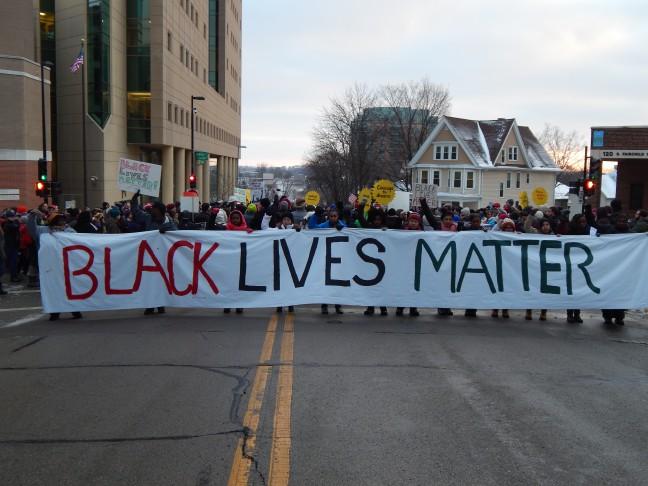Last Monday, Ferguson was set ablaze with anger over the exoneration of white police officer Darren Wilson, who fatally shot black 18-year-old Michael Brown. Racial profiling by law enforcement is a problem we see in many cities, including Madison — a city where African-Americans make up seven percent of the population but constitute more than half of people cited or arrested for marijuana use. Protests to condemn the grand jury’s decision occurred across the country. In our very own city, hundreds of protesters marched from the Dane County jail to the Capitol to voice disapproval over the decision.
Racial gaps that disproportionately target minority groups in the justice system are not unique to Ferguson. According to an analysis by USA Today, African-Americans are arrested at a rate more than nine times higher than members of other racial groups in Madison. In regards to this figure, Madison Police Chief Michael Koval was quoted as saying, “I think it would be remiss to suggest the police get out of this whole thing with a free pass. We have to constantly be doing the introspective look at who we are hiring and how we are training.”
Madison may not have had its Ferguson moment yet, but this statistic makes the case that it’s not far-fetched. When seeing footage of the damage caused by protests following the announcement of the decision, it’s easy to automatically condemn these acts of violence as heinous and unfounded. However, due to critical misunderstandings of the racial predicament in this country, many people are misinterpreting the true causes of these protests.
In no way am I condoning violent actions, but rather believe we must understand the causes and contexts of this kind of protest before condemning it. The protests following the grand jury’s decision were not without cause. To suggest they are a product of “savages” or blind, unfounded rage, as former New York Police commissioner Bernard Kerik suggested in an interview with CNN, is misrepresentative and ignorant of the hurt, mistrust and pessimism caused by historical and current racial oppression.
Although the tragedy of Michael Brown’s killing alone is rage-inspiring, it is not the only cause of the anger being felt in the streets of America’s urban centers. The true catalyst for this indignation is hundreds of years of racially-based oppression against African-Americans, coupled with ongoing injustice with little optimism for change available. The message given throughout history and modern times is the same – brutality is excused when used against minorities. This barbaric notion is the foundation American racial equality movements have sought to dismantle. Michael Brown’s killing is not an isolated incident, it was just one of several encounters that have the suspicious commonality of police shooting an unarmed black man.
This trend proves we have a long way to go to achieve racial equality. Sure, the “Whites Only” placards have been removed from public view, but the predicament of ethnic minorities in America remains largely the same. Stereotypes run rampant and the attack against minority access to voting by Voter ID laws is erasing one of the main achievements of civil rights legislation. Also, the economic empowerment of African-Americans, promised by the American government and movement leaders after the Civil Rights acts were signed, was never realized.
Here is where we are misinterpreting the cause of violence in this instance. It’s not an act of savage revenge against the perpetrators or blind violence without cause. It is the expression of an immense suffering. After the grand jury verdict, which reaffirmed centuries of excused killings of black people, extreme anger and hurt is the only reaction one can imagine. To say that the oppressed are in the wrong for feeling frustrated or angry over their oppression would be to participate in the racial injustice that plagues our state and country’s criminal justice systems. While violence is not the only avenue for these feelings, in the case of these protests, it comes as a provoked reaction.
Furthermore, isn’t it an interesting contradiction that some of those calling for the Ferguson protesters to be peaceful are the same ones who claim the best protection against tyranny is a well-armed populace?
Those calling for peaceful protests aren’t incorrect. It’s true that violence cannot be the answer to solving the racial predicament in American society. The city of Madison and the campus itself need to peacefully arise to the challenge of ending racism, and there are things we can do starting now. We need to be zealous with our compassion toward one another, using every facet of communication, protest and democratic action possible to show this. To not act would be to side with those who seek to maintain inequality in our lives. Every American is affected by the racial injustice in this country. We cannot condemn violence as inherently wrong without first examining the context and cause of the violence itself.
Nichalous Pogorelec ([email protected]) is a sophomore studying sociology.





















